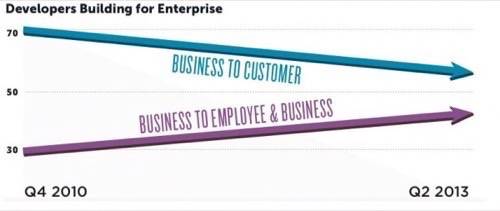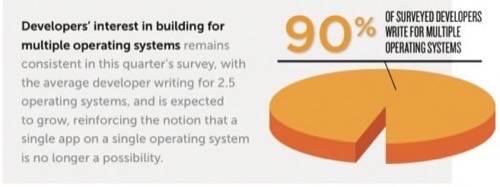
Mobile in the enterprise is like crack. First, organizations got a little taste of it and liked the results. Now they crave more. And mobile developers are scrambling to hook them up.
Unlike consumers, enterprises tend to sample addictive new technologies warily. Smartphones and cloud services take months or years to integrate into the enterprise. Often they start in one department (like sales or accounting or IT) and then spread throughout the rest of a business. For instance, salespeople will adopt a customer relationship management (CRM) mobile app to help improve efficiency. The rest of the organization will see how well it works and make requests for their own mobile apps.
This is how the mobile imperative spreads through an enterprise—horizontally, from worker to worker, rather than from the top down. Whereas many organizations will have five to ten essential apps, there is need and desire to build dozens (or hundreds) to serve all aspects of business functions. These apps are both for external, customer-facing purposes, as well as internal organizational purposes.
“Enterprises have had just a taste,” said IBM’s VP of mobile enterprise Phil Buckellew. “Mobility is moving into the rest of the enterprise.”
Developers Follow Suit
Startups and established technology companies alike are coming to realize the value of selling mobile solutions to the enterprise. The fact of the matter is that building apps for consumers is a very hit-or-miss business. And, as we have seen, building tools for mobile developers is a dicey proposition as well. Enterprise is where the money is and many developers have come to that realization over the last year. Instead of building the best new mobile social network (hello, Path), they are building apps for accountants, for salespeople, for IT gurus and administrators.
Once a quarter, Appcelerator surveys the developers who use its Titanium Studio integrated developer environment, or IDE, and other mobile tools. (It conducts the survey in association with research firm IDC.) In its most recent survey of 6,046 Titanium developers released today, Appcelerator saw a distinct increase in developers interested in building apps for the enterprise over the last three years.
Since the fourth quarter of 2010, enterprise-focused developers have risen from 29.3% of Appcelerator’s survey respondents to 42.7% in the second quarter of 2013. Developers primarily interested in consumer-facing apps have shrunk from 70.7% to 57.2% in the same time period.

It is important to note that Appcelerator, as a company, has moved more into enterprise services in the last three years. A survey of its developers will likely reflect that change. At the same time, Appcelerator and its developer base are large enough to be indicative of mobile app ecosystem at large. (Appcelerator’s Michael King, director of enterprise strategy, notes that Appcelerator does a separate survey focused on enterprise developers; this one targeted the mobile developer community at large.)
The bottom line: Enterprises need apps, are willing to pay for the creation and the service needed to maintain and integrate them.
Connecting Mobile To The Cloud
To serve the enterprise, developers need the tools necessary to provide integration and support for large organizations. These tools include things like IDEs, continuous deployment, tracking and analytics, device and app management and security, strategy, consulting, design and cloud integration.

Mobile-focused cloud services have gone from a few startups to more than 40 companies, all clamoring for attention and shouting in every which way to be heard by developers and enterprises. The big three in this category—known in the industry as “backend-as-a-service”—are Parse, (recently acquired by Facebook); StackMob; and Kinvey. They’ve been joined by the likes of Antenna Software, DreamFactory, AnyPresence, Proxomo, OpenKit, FatFractal, Kidozen and a variety of others, all jousting for enterprise’s biggest goal: to attach their mobile applications to the cloud as easily as possible.
See also: The Rise Of Mobile Cloud Services
Enterprises like services that are easy to plug in and maintain. That desire is what originally led to the whole “as-a-service” movement. As enterprise needs move to mobile, though, the services are evolving. Appcelerator’s survey notes that 61% of developers think that these backend-as-a-service solutions will replace traditional platform-as-a-service for mobile developers over the next 24 months. That statistic is potentially self-serving: Appcelerator now provides its own BaaS platform after buying Cocoafish last year. Yet, it highlights how important mobile cloud services are to enterprise development.
Which Enterprises Are Adopting Mobile Solutions First?
Top 8 enterprise sectors adopting mobile:
Banking
Healthcare
Transportation
Government
Telecommunications
Insurance
Retail
Automotive
Some enterprise industry sectors tend to adopt new technology before others. Buckellew said that IBM focused on eight different industry categories that are in need of mobile solutions are actively building in search of services.
Think about that list for a second. Some categories of apps will be inherent in any type of enterprise (expense reporting, contact management etc.) while other industry sectors will require more specific apps and services. For instance, the banking industry will place an extreme emphasis on security and management while the automotive industry will need great solutions for cellular connectivity in moving vehicles.
It is the breadth and variety of enterprise needs (and the billions upon billions of dollars controlled by those companies) that make it such an enticing area for mobile developers. No one solution will be perfect for every organization. Hence, opportunity abounds for enterprising entrepreneurs to build their own billion dollar businesses.

















